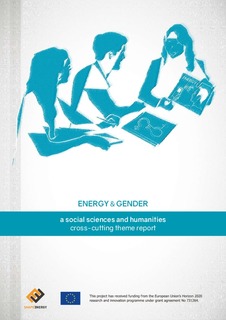| dc.description.abstract | Considering the strict emission targets declared in the 2015 Paris Agreement, a gradual transition of our societies towards low-carbon energy systems seems likely. This energy transition will affect everyone, and to facilitate this move, the proposed solutions will need to engage most of the population. This will require a conscious and comprehensive perspective on gender to address matters of under-representation, differences in energy consumption, practices and transportation, and the underlying assumptions within the solutions presented. These are just some of the reasons why gender is recognised as an important, cross-cutting issue in all research done under the Horizon 2020 work programmes. Still, aspects of gender are currently not being sufficiently addressed in energy research as a whole.
As one of four cross-cutting theme reports delivered for the SHAPE ENERGYproject, this report strives to explore what can be gained by explicitly focusing on gender when researching the consumption and production of energy. To accomplish this, we have scoped Social Sciences and Humanities (SSH) research that engages with this field to present a broad overview of the work that has been done thus far. The structure of these findings is inspired by the four central topics in the SHAPE ENERGY project: (1) Energy efficiency and using less; (2) Competitive, secure, low-carbon energy supply; (3) Energy system optimisation and smart technologies; and (4) Transport sector decarbonisation.
Based on the research reviewed, we aim to demonstrate the relevance of including ‘gender’ as a relevant category within energy research, not only for our fellow energy-SSH researchers, but also for policymakers, stakeholders, researchers from other disciplines and other interested parties. This will be concluded with a set of practical and concise recommendations addressing EU-research funding, other energy research projects and platforms, and SHAPE ENERGY platform activities.
Our main findings and recommendations are:
The interplay of gender and energy is a worthwhile and important topic for research. A gender perspective can enhance energy research and improve mitigation measures. Overlooking facets of gender, can at worst, make for unsatisfactory analysis.
More research on gender and energy is needed. There are interesting perspectives and hypotheses within this field, but there is a severe lack of more strenuous empirical explorations of the effects and implications of gender imbalance, and gendered stereotypes and assumptions within the research currently produced.
Gender should also be considered when studying technologies intended for decreasing emissions. For instance, ‘smart’ household technologies, energy-saving refurbishments, and low- or zero-emission vehicles seem at the moment built on earlier culturally held assumptions, which also include gender. As these technologies will need a substantial adaptation rate if we are to achieve ambitious energy goals, we need to understand these cultural underpinnings.
Energy projects should take into account not only gender balance, but also employ gender-reflexive research. This means that all researchers must question the gendered assumptions and stereotypes that their work may build on, and how this might affect the results produced.
Gender is however not a simple binary and cannot be reduced to a single parameter in a questionnaire, or a solitary box in a checklist. It is instead crucial to devote time and resources, and to employ experts when implementing gender perspectives in research programmes and policymaking. | nb_NO |
